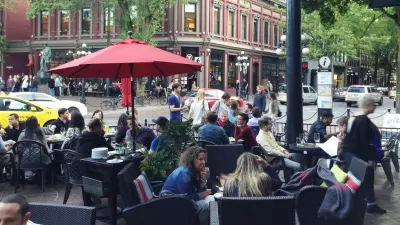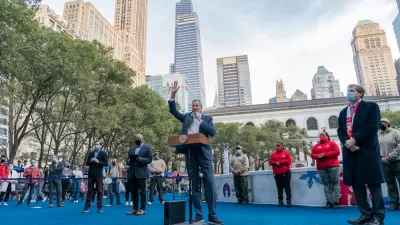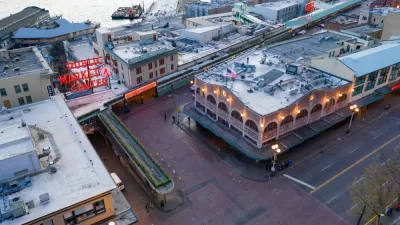Local governments have more tools than money to relieve some of the economic experience experienced by residents and businesses as the economic effects of the novel coronavirus linger just as long as the public health crisis it causes.

The zoning and planning consulting firm Code Studio has published a blog post that digs into one of the big questions facing planners and city officials throughout the coronavirus pandemic: "[W]hat can cities do through zoning (the land use controls on private property) to help businesses and the economy get back up and running as quickly and safely as possible?"
The prescription presented here has a common theme: local government should lift some of the stifling zoning restrictions common in U.S. cities today. The list of recommended actions follows, with more details provided in the source article:
- Allow temporary use of parking lots for outdoor dining/drinking.
- Allow pop-up retail/outdoor display.
- Relax temporary sign restrictions.
- Eliminate parking requirements – require spaces for bikes instead.
The list above might complicate public opinion about the purview of zoning codes in the United States, but perhaps in a year where patterns and behaviors have taken on a measure of simplicity in response to an unprecedented public health threat, zoning codes should be expected to adopt a new, long-sought measure of simplicity as well.
Related on Planetizen: How Zoning Reform Can Help Businesses Transition to Outdoor Operations (May 15, 2020)
FULL STORY: ZONING IN A POST-COVID WORLD: PART I

Planetizen Federal Action Tracker
A weekly monitor of how Trump’s orders and actions are impacting planners and planning in America.

Restaurant Patios Were a Pandemic Win — Why Were They so Hard to Keep?
Social distancing requirements and changes in travel patterns prompted cities to pilot new uses for street and sidewalk space. Then it got complicated.

Maui's Vacation Rental Debate Turns Ugly
Verbal attacks, misinformation campaigns and fistfights plague a high-stakes debate to convert thousands of vacation rentals into long-term housing.

In California Battle of Housing vs. Environment, Housing Just Won
A new state law significantly limits the power of CEQA, an environmental review law that served as a powerful tool for blocking new development.

Boulder Eliminates Parking Minimums Citywide
Officials estimate the cost of building a single underground parking space at up to $100,000.

Orange County, Florida Adopts Largest US “Sprawl Repair” Code
The ‘Orange Code’ seeks to rectify decades of sprawl-inducing, car-oriented development.
Urban Design for Planners 1: Software Tools
This six-course series explores essential urban design concepts using open source software and equips planners with the tools they need to participate fully in the urban design process.
Planning for Universal Design
Learn the tools for implementing Universal Design in planning regulations.
Heyer Gruel & Associates PA
JM Goldson LLC
Custer County Colorado
City of Camden Redevelopment Agency
City of Astoria
Transportation Research & Education Center (TREC) at Portland State University
Jefferson Parish Government
Camden Redevelopment Agency
City of Claremont





























